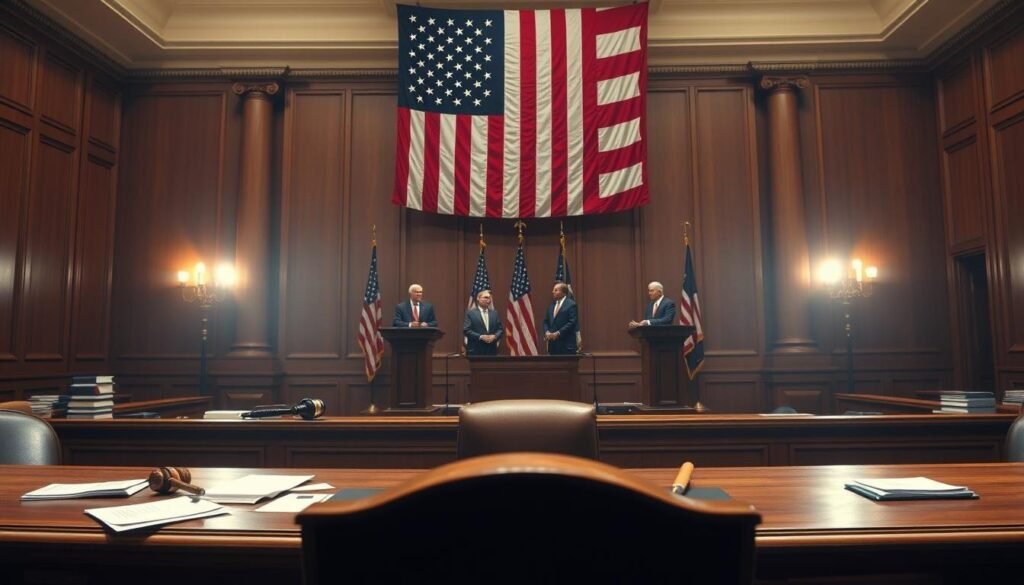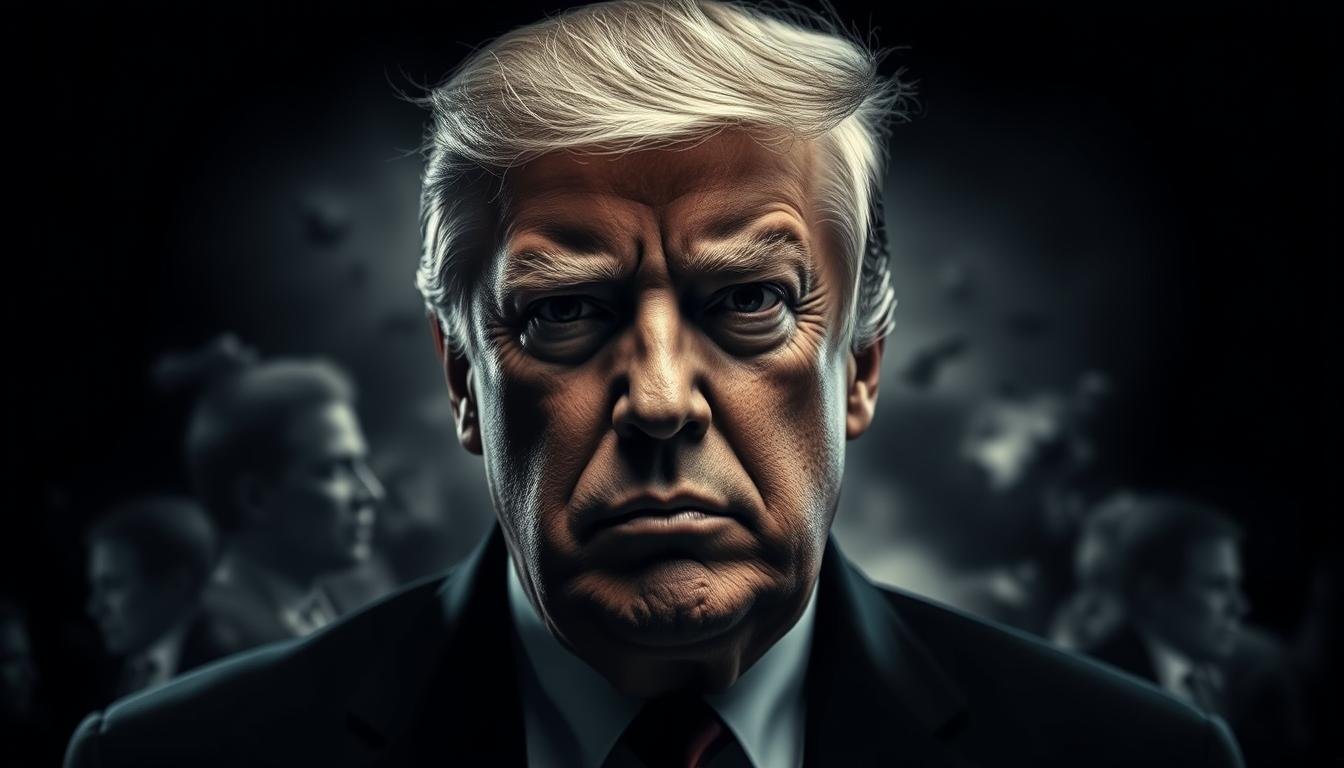Can the President Be Sued for Defamation? Have you ever thought about what happens if a president says something that might be false? The idea of executive privilege often comes up in these situations. It’s about the legal limits of a president’s actions.
Knowing about defamation law is key here. It changes a lot and affects how cases against public figures are handled. Presidential defamation cases are especially tricky because of the president’s unique role and power.
Looking into this topic, you’ll see how executive privilege and defamation law mix. This raises big questions about who’s accountable and what limits there are on the president’s power.
Contents
- 1 Presidential Immunity: An Overview
- 2 Historical Precedents of Presidential Lawsuits
- 3 Can the President Be Sued for Defamation?
- 4 Recent Defamation Cases Against Presidents
- 5 Practical Challenges in Suing a President
- 6 Conclusion: Can the President Be Sued for Defamation?
- 7 FAQ
- 7.1 What is presidential immunity?
- 7.2 Can the President be sued for defamation?
- 7.3 What constitutes an “official act” by the President?
- 7.4 How does the Department of Justice certification process affect lawsuits against the President?
- 7.5 What is the Federal Tort Claims Act (FTCA), and how does it relate to suing the President?
- 7.6 What are the practical challenges of suing a President for defamation?
- 7.7 Can you provide examples of recent defamation cases against Presidents?
- 7.8 How do court rulings on presidential immunity impact future Presidents?
Presidential Immunity: An Overview
Exploring the legal world of the President, immunity is key. This legal concept has grown over time. It shapes how the President is seen under the law.
Historical Development of Executive Privilege
Executive privilege started early in America. George Washington was the first to use it. It helps protect the President’s talks and decisions from being looked into too closely.
Through court rulings and laws, executive privilege has grown. It now has clear limits and uses.
Limitations on Executive Privilege
Even with its strong protections, executive privilege isn’t complete. Courts say it can be broken in some cases. This includes when the information is really needed or for a criminal probe.
Article II Powers and Protections
Article II of the Constitution gives the President many powers. These include the right to pardon, lead the military, and make treaties. It also suggests the President might be immune from some lawsuits.
Separation of Powers Considerations
The U.S. Constitution divides power among three branches. This includes the legislative, executive, and judicial. Presidential immunity helps keep the judiciary from getting in the President’s way.
Here’s how these ideas work together:
| Concept | Description | Implications |
|---|---|---|
| Executive Privilege | Protects Presidential communications | Limits Congressional oversight |
| Article II Powers | Grants Presidential authority | Shapes executive branch actions |
| Separation of Powers | Divides governmental authority | Prevents branch encroachment |
Historical Precedents of Presidential Lawsuits
It’s key to know the history of presidential lawsuits to understand executive power and legal responsibility. Past legal decisions have greatly influenced today’s view on presidential immunity.
The idea of absolute immunity for presidential actions is a topic of ongoing debate. Absolute immunity means some government officials, like the President, can’t be sued for their official duties.
Absolute Immunity for Official Acts
The Supreme Court has said the President is fully protected for actions done as part of their job. This protection helps the President focus on their duties without worrying about lawsuits.
Scope and Limitations of the Ruling
Even though the ruling offers wide protection, it’s not complete. The Court says immunity doesn’t apply in all cases, especially when the President acts outside their job duties.
| Category | Description | Immunity Status |
|---|---|---|
| Official Acts | Actions taken within the scope of presidential duties | Absolute Immunity |
| Unofficial Acts | Actions taken outside the scope of presidential duties | No Immunity |
No Immunity for Unofficial Acts
The President doesn’t have immunity for actions done outside their official duties. It’s important to remember that actions not part of their job can lead to legal trouble.
Implications for Future Presidents
Legal precedents from past lawsuits have big effects on future presidents. Knowing these can help you understand the balance between executive power and legal responsibility.
Can the President Be Sued for Defamation?
Understanding if a president can be sued for defamation depends on knowing the difference between official acts and personal communications. It’s often hard to tell if a president is speaking as a public figure or as a private person.
It’s key to know if a president’s actions were official or personal. Official acts are those done as part of their job.
What Constitutes an “Official Act”
An official act is any action by the president as the head of the executive branch. This includes public statements, policy decisions, and other duties of the office.
Personal Communications vs. Presidential Statements
It’s important to tell personal talks from official statements. While personal talks are not official, it can get tricky when they’re shared publicly.
The Federal Tort Claims Act (FTCA) lets people sue the government for certain wrongs, like defamation. But it doesn’t cover the president’s actions.
Department of Justice Certification Process
The Department of Justice decides if a president’s actions were part of their job. This decision can greatly affect defamation lawsuits.
| Legal Consideration | Description | Impact on Defamation Lawsuit |
|---|---|---|
| Official Act | Actions taken within the president’s official duties | Immunity from personal liability |
| Personal Communications | Statements made outside official duties | Potential personal liability |
| Federal Tort Claims Act | Law allowing suits against the federal government for certain torts | Does not directly apply to the president’s actions |
Recent Defamation Cases Against Presidents
Defamation cases against presidents are on the rise. This is testing the limits of presidential immunity. You might be curious about how these cases affect a president’s legal standing.

E. Jean Carroll’s lawsuit against former President Donald Trump is getting a lot of attention. Carroll claimed Trump defamed her by denying her sexual assault allegations. This case is key because it questions Trump’s immunity for statements made while in office.
Other Notable Defamation Claims
Other notable figures have also sued presidents or former presidents for defamation. These cases raise complex legal questions. They involve the extent of presidential immunity and the difference between official and personal acts.
Court Rulings on Presidential Immunity
Court decisions in these cases have shed light on presidential immunity. For example, a court might decide that some presidential statements are protected. But others are not.
Appeals and Supreme Court Considerations
These defamation cases often go to appeal, possibly reaching the Supreme Court. The Supreme Court’s verdict could greatly affect presidential immunity and future defamation cases.
The legal landscape is changing. This has big implications for how presidents are held accountable for their words and actions.
See Also: Why Did FDR Serve 4 Terms as President?
Practical Challenges in Suing a President
Trying to sue a sitting president is very hard. The process is complex and full of obstacles.
One big problem is the statute of limitations. This is the time you have to file a lawsuit. If you don’t know the full extent of your damages in time, you might miss your chance. This can greatly affect your ability to get justice. It’s very important to understand this time limit.
| Challenge | Description | Impact |
|---|---|---|
| Statute of Limitations | Time limit for filing a lawsuit | Potential expiration before full damages are known |
| Stay of Proceedings | Potential delay during presidency | Prolonged legal process |
| Media Coverage | Influence on public opinion | Prejudicial impact on the case |
Stay of Proceedings During Presidency
A stay of proceedings during the presidency can make the legal process much longer. This delay can make it hard for the plaintiff to get justice on time.
Media Coverage Impact
Media coverage can greatly affect public opinion. This can influence the outcome of the case. High-profile cases are especially vulnerable to media bias.
Political Consequences of Litigation
Litigation against a president can have big political effects. It can make the legal process political and change the political landscape.
Conclusion: Can the President Be Sued for Defamation?
The idea of presidential immunity affects whether you can sue a president for defamation. The balance between keeping the president accountable and ensuring they can do their job is tricky. On one side, suing a president could make them answerable to the law. But, it might also lead to many lawsuits that could distract them from their duties.
Looking at past cases and recent ones shows how complex this issue is. Courts have struggled to figure out how much protection a president should have. The outcome affects how the presidency works. When you think about suing a president, you see how complex the legal rules are.
The relationship between keeping the president accountable and their ability to do their job is key. Understanding this balance helps us see the legal and political world around presidential actions. By diving into the details of presidential immunity, we learn more about how the office and its leaders are governed.
See Also: Was John Adams a Successful President?
FAQ
What is presidential immunity?
Presidential immunity is a legal rule. It protects the President from some lawsuits and prosecutions. This is because the President needs to act freely and without fear of legal trouble.
Can the President be sued for defamation?
Yes, the President can be sued for defamation. But, it depends on if the statement was made as part of their job or personally. Also, if the President has immunity.
What constitutes an “official act” by the President?
An “official act” is something the President does as part of their job. This might be protected by immunity. But, what counts as an official act can be tricky to figure out.
How does the Department of Justice certification process affect lawsuits against the President?
The Department of Justice’s certification can change things. It decides if the President’s actions were part of their job. If so, the U.S. might take the President’s place in the lawsuit.
What is the Federal Tort Claims Act (FTCA), and how does it relate to suing the President?
The FTCA lets people sue the U.S. for certain wrongs done by government workers. This could include the President. It’s a way to sue the President, but there are limits.
What are the practical challenges of suing a President for defamation?
Suing a President for defamation is hard. There are issues like time limits, court delays, and media attention. These make it even more complicated.
Can you provide examples of recent defamation cases against Presidents?
Yes, there are examples. Like the case against Donald Trump by E. Jean Carroll. The court said Trump’s words weren’t protected by immunity. Other cases also test how far immunity goes.
How do court rulings on presidential immunity impact future Presidents?
Court decisions on immunity are very important. They set rules that future Presidents must follow. These rules can affect if and how they can be sued.

Hi, I am Tatum Bradford from Washington. I have a background in political science and work as a senior revenue officer. I love learning about U.S. presidents and sharing interesting facts about political history.

